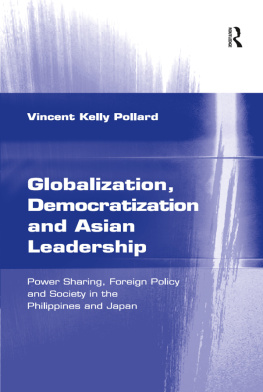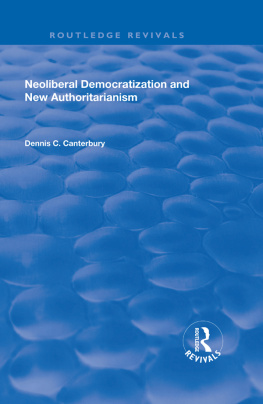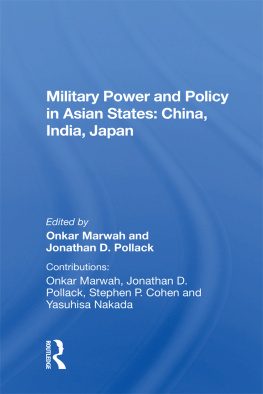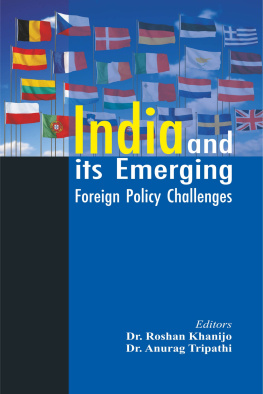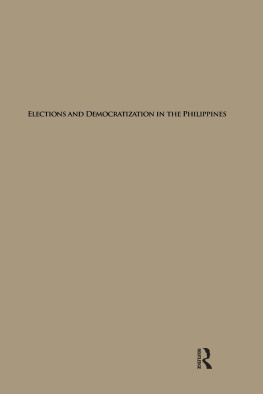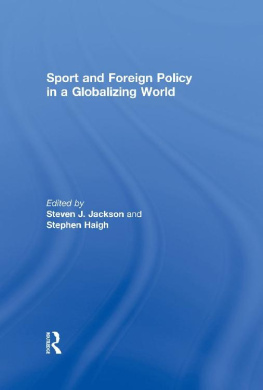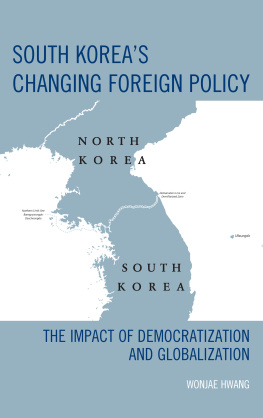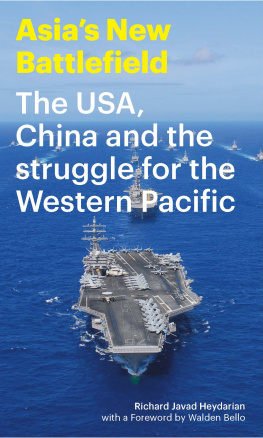First published 2004 by Ashgate Publishing
Published 2016 by Routledge
2 Park Square, Milton Park, Abingdon, Oxon OX14 4RN
711 Third Avenue, New York, NY 10017, USA
Routledge is an imprint of the Taylor & Francis Group, an informa business
Copyright 2004 Vincent Kelly Pollard
All rights reserved. No part of this book may be reprinted or reproduced or utilised in any form or by any electronic, mechanical, or other means, now known or hereafter invented, including photocopying and recording, or in any information storage or retrieval system, without permission in writing from the publishers.
Notice:
Product or corporate names may be trademarks or registered trademarks, and are used only for identification and explanation without intent to infringe.
British Library Cataloguing in Publication Data
Pollard, Vincent Kelly
Globalization, democratization and Asian leadership: power sharing, foreign policy and society in the Philippines and Japan
1. Political participation - Japan 2. Political participation -Philippines 3. Japan - Foreign relations - 1989-4. Japan-Foreign relations - 19451989 5. Japan - Foreign relations -Citizen participation 6. Philippines - Foreign relations -1973 7. Philippines - Foreign relations - Citizen participation 8. Japan - Politics and government - 1945-9. Philippines - Politics and government - 1946
I. Title
327.52
Library of Congress Control Number: 2003065711
Transfered to Digital Printing in 2010
ISBN 9780754615392 (hbk)
ISBN 9781138263826 (pbk)
Foreign policies are preferences. These are preferences of executive government officials to maintain or modify the international system affecting the society, as well as how they affect people living beyond the countrys borders. But government officials are not the only people with international preferences. Examining foreign policy making in East and South East Asia will help us understand causes of success and failure in the foreign policy arena.
For expression of citizen preferences in international affairs, the season of nongovernmental activity in foreign policy making began earlier and has lasted longer than any standing government expected. In 1900, Chinese in the Boxer Rebellion protested against foreign extraterritoriality. In the same year, Americans like Samuel Clemens in the Anti-Imperialist League excoriated the U.S. war of suppression against the revolutionary Filipinos Malolos Republic. And in the May Fourth (1919) Movement, activist Chinese protested Japans incursions and U.S. President Woodrow Wilsons selectively Eurocentric defense of self-determination at the Versailles peace conference. Elsewhere anticolonial movements picked up steam, for example, in South Asia where Gandhi and Chandra Bose contended for leadership. Following Japans defeat in the Pacific War, Asian countries gained constitutional independence by devolution or by national liberation warfare. By the end of the Cold War, practical experience with diverse styles of representative democracy has spread and deepened in Asia, and domestic group activity in support of and in spite of executive foreign policy makers efforts has become increasingly sophisticated.
If this lively milieu is a school for politics in Asia and elsewhere, it provides an education for different kinds of students. Foreign policy-focused social movements provide learning experiences for all individuals and organizations involvedprotest groups and established governments. As a result, official governments have also learned to adjust to citizen activism in foreign policy making. Understandably, governments do not always admit this publicly. And civil society organizations overlook it at their own peril.
So, how do foreign policy executives pursue their preferences? North Atlantic versions of representative democracies are not the only working models. Indeed, other options are available or may yet be developed in the future. In various ways internationally, Asian and other foreign policy executives in official governments share powerwillingly and unwillingly, wittingly and unwittinglyinside and outside their governments and societies. Despite the past history and influence of North American and British models, they compete with others today.
The book compares the social process of foreign policy making in the presidential Philippines and parliamentary Japan. In these countries, highly motivated public interest groups (nongovernmental organizations) sometimes become competing centers of influence inside, alongside and outside official governments and have developed sophisticated power sharing arrangements with one another in pursuing preferences beyond their respective countries national borders. Activists, practitioners, scholars and citizens will want to learn more about this.
Cases selected for this book include regional intergovernmental cooperation, military relations and foreign aid or official development assistance. Each is sufficiently pivotal in its implications to deserve study on its own merits and for its immediate and longterm effects. That any one of these cases may not typify every aspect of the social process of foreign policy in the Republic of the Philippines or in Japan does not make them less important. Long before the collapse of the Soviet Union catapulted globalization and its ideological sibling globalism into prominence, a planet-encircling mass communications news media was wielding power domestically and internationally.
Foreign policy executives who, by choice or default, do not publicly communicate the links between one foreign policy and another can fail to be as successful as they might prefer. For example, President Marcos of the Philippines skillfully orchestrated a regional cooperation media show at the outset of a bitter national campaign before voters who would elect one third of the members of the Senate. The Malacaang Palace media blitz highlighted the involvement of the Marcos administration and its predecessors in co-launching the Association of South East Asian Nations (ASEAN) in August 1967. At the time, however, Marcos did not communicate the extreme degree to which he was keeping his options open to pursue territorial claims on Sabah (North Borneo), Malaysia. Within months, Marcoss failure to do so would vitiate the impact of the ASEAN initiative and others his administration had taken earlier to improve regional cooperation among anticommunist governments in the region.
In contrast to Marcos, President Aquino of the Philippines articulated the full range of her preferences for military relations with the United States.
However, she did so in fragmented presentations for domestic, bilateral and regional audiences. The resulting information asymmetry in the mid-1980s highlighted the opportunity cost. She kept her options open about what she would eventually do about the future of the Philippines-United States Military Bases Agreement but did not link this clearly enough or soon enough to other elements among her military relations preferences. Aquinos lack of clarity on that point mattered because she had already subordinated that medium-range future option to higher-priority short-term preferences. Redemocratizing the Philippines was salient among them.

